DOLE RO-8
conducts payout to TUPAD #BKBK beneficiaries in Samar
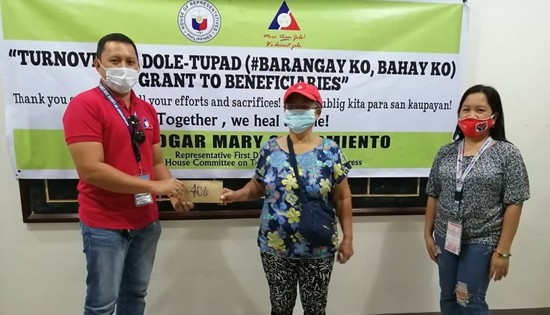
By
NORMA RAE S. COSTIMIANO
July 16, 2020
TACLOBAN CITY – The
Department of Labor and Employment Regional Office No. 8 through its
Samar Field Office conducted payout of wages amounting to
Php1,615,250.00 to 497 beneficiaries of Tulong Panghanapbuhay sa
Ating Disadvantaged/Displaced Workers #Barangay Ko/Bahay Ko (TUPAD #BKBK)
in the four municipalities of Samar province.
In two separate schedules,
payouts were conducted by the team of DOLE-SFO headed by Engr.
Aleksei Ceasar D. Abellar in Catbalogan City and Sta. Margarita on
June 11, 2020 and in the municipalities of San Jorge and Pagsanghan
on June 17, 2020.
Mayor Leoncio U. De Guia
of San Jorge, Samar expressed gratitude and support to the
department for the assistance extended to his constituents. He said
that in this time of pandemic where many workers have been
displaced, the government is really a big source of relief.
Beneficiaries happily
received their wages which is the fruit of their services rendered
during the ten-day period of employment.
In all the payouts
conducted, Engr. Abellar thanked all the LGUs for their active
support to the DOLE program intended to provide relief to the
displaced informal workers. He encourages all the beneficiaries and
likewise reminded them to spend the money wisely.
“In behalf of my Regional
Director, Sir Yahya A. Centi, I would like to extend my heartfelt
thanks to our supportive local chief executives and PESO Managers
for all the assistance especially in the implementation of the
program. You are indeed our great partners in deliveriing services
to our clients”, said Abellar.
US Congresswoman
Jan Schakowsky, 49 US Legislators call to rescind Anti-Terror Law
Press Release
July 16, 2020
WASHINGTON, DC – On
Wednesday morning, U.S. Representative Jan Schakowsky (D-IL), a
Senior Chief Deputy Whip in the U.S. House of Representatives, urged
the Philippine government under President Rodrigo Duterte to rescind
the newly-signed Anti-Terror Law (ATL), which goes into effect in
the Philippines on July 18.
“We stand with people of
the Philippines, Filipino Americans, and grassroots orgs like Malaya
Movement and ICHRP-US in demanding a genuine democracy where dissent
is accepted and encouraged instead of criminalized,” said Rep.
Schakowsky.
“In the past four years,
Duterte has unleashed state perpetrated terror against poor
Fililpinos, farmers, workers, Indigenous peoples, people of faith,
trade unionists, and human rights defenders. Only through an
organized mass movement can we defeat Duterte's dictatorship,” said
Nicanora Montenegro, Malaya Movement spokesperson.
Rep. Schakowsky, along
with 49 additional members of the U.S. Congress, sent a letter to
Philippine Ambassador to the U.S. Jose Manuel Romualdez to convey
these concerns, raising the documented numerous cases of human
rights violations and extrajudicial killings that have occurred in
the four years of the Duterte administration.
“With a long track record
of using drug laws and martial law in parts of the country to target
innocent activists who did nothing other than speak out against
government policies, we clearly are left with no option but to view
this as just the latest and most egregious effort to silence those
fighting for basic and fundamental human rights in the Philippines,”
said the letter.
The U.S. Members of
Congress who signed onto the letter include the Chair and Ranking
Members of the House Foreign Affairs Committee Eliot Engel (D-NY)
and Chris Smith (R-NJ), as well as the Chair of the Congressional
Asian Pacific Caucus, Judy Chu (D-CA).
“We see the targeted
killing of labor rights and human rights activists, silencing of
Rappler media outlets, ongoing attacks against any who dare to speak
out against Duterte’s violence and trampling of rights. We are
telling them these egregious attacks cannot stand,” said Rep. Judy
Chu, the first Congressional Representative to speak out against the
attempted assassination of U.S. citizen and activist Brandon Lee in
front of his home in the Cordillera region of the Philippines last
year.
Lawyer and former
Philippine Congressman Neri Colmenares thanked the U.S.
representatives for showing concern for the worsening human rights
situation in the Philippines and encouraged U.S. Congress to support
the Philippine Human Rights Act (PHRA), a bill that would put
restrictions on US military aid to the Philippines due to human
rights violations being linked to Philippine state security forces.
“I'm sure not a single
American taxpayer would like to spend American dollars to buy
bullets or guns to kill the Filipino people. It is important for us
to pass the Philippine Human Rights Act because it will put pressure
on the Filipino government to tone down its human rights attacks.
This bill will save lives in the Philippines,” said Colmenares.
The International
Coalition for Human Rights in the Philippines- US chapter thanked
the 50 representatives for their action and encouraged the
international community to continue to support the Filipino people’s
fight against the ATL and to defend their basic democratic rights.
Over P7-M TUPAD
funds to benefit Ormoc City
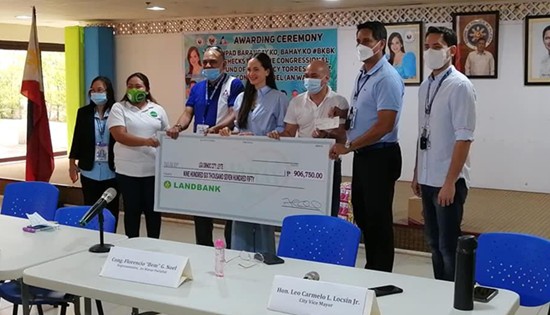
By
NORMA RAE S. COSTIMIANO
July 16, 2020
TACLOBAN CITY – A
total of P7,897,500.00 funds under the Tulong Panghanapbuhay para sa
Ating Disadvantaged/Displaced Workers (TUPAD) program of the
Department of Labor and Employment will benefit some 2,430 displaced
informal sector workers of Ormoc City.
In a simple turnover
ceremony held last 26 June 2020, Mayor Richard Gomez personally
received the said assistance for the people of Ormoc City.
Congressman Florencio “Bem” Noel of An Waray Partylist awarded
P906,750.00 worth of TUPAD assistance to benefit 279 workers while
Congresswoman Lucy Torres Gomez of the 4th District of Leyte turned
over TUPAD checks amounting to P6,262,750.00 good for 1,927
Ormoceños. Also, Mr. Edgar B. Tabuyan, Chief of DOLE West Leyte
Field Office (WLFO) representing Regional Director Yahya A. Centi,
handed over P728,000.00 worth of TUPAD (Post-COVID) funds to benefit
224 displaced workers of the city.
Mayor Gomez expressed his
gratitude for the assistance received for his constituents who are
experiencing the adverse effects of the COVID-19 pandemic. He said
that these financial aids will really boost the morale of the
affected informal sector workers in the city.
Likewise, both Cong. Gomez
and Cong. Noel extended their sincere thanks and appreciation to RD
Centi and Assistant Director Amable C. Roa for the continued support
to the Leyteños particularly to the people of the 4th District of
Leyte.
Mr. Tabuyan in response
gladly committed that DOLE will continue to deliver its programs and
services to the people of Region VIII especially in this time of
crisis. He likewise recognized the active support from the local
chief executives.
“In behalf of my Regional
Director, I would like to assure you that DOLE will always be of
help to the people of Eastern Visayas. We are also thankful because
we have active leaders who support the cause and intentions of our
TUPAD program”, said Mr, Tabuyan.
Also during the ceremony,
TUPAD check amounting to P325,000.00 was handed over to Mayor
Rolando VIllasencio of LGU Merida, Leyte. 100 informal workers from
the said municipality will likewise benefit from the grant.
(with reports from Edgar B. Tabuyan)
DAR Samar honors
PARCCOM chair
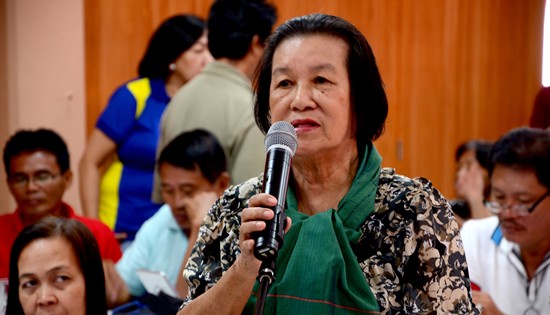
By
GABRIEL MARK OCENAR and
TERESA TIJOL
July 15, 2020
TACLOBAN CITY – It
does not matter where one came from, but the pureness of the heart
to serve.
Olongapo City-born Albina
Palaminiano Alvarez-Valles has contributed so much in the
implementation of the Comprehensive Agrarian Reform Program (CARP)
in the province of Samar in her capacity as the chairperson of the
Provincial Agrarian Reform Coordinating Committee (PARCCOM).
She was instrumental in
improving the quality of life of many agrarian reform beneficiaries
(ARBs) throughout the province.
Mana Nene, as she is
fondly called, was a teacher in her hometown when she took a
vacation in Catbalogan in the 50s. During her stay here, she met
Ponciano Valles, Sr., then a town councilor who later on became the
vice-mayor. Romance bloomed and the two got married, which made Mana
Nene decide to permanently settle here.
While in Catbalogan, she
got employed at the Commission on Audit. After her retirement from
government service, Mana Nene continued serving the public with her
involvement in numerous organizations.
Her membership in the
Samar People’s Economic Council Foundation, Inc. (SPECFI), led her
to PARCCOM in 2009 as the sectoral representative of non-government
organizations (NGOs). In 2011, she was appointed by President
Benigno Aquino III as chairperson of the PARCCOM of Samar, which is
tasked to coordinate and monitor the implementation of CARP
throughout the province.
Samar Provincial Agrarian
Reform Program Officer II (PARPO II) Celsa Mabutin shared that with
Chairman Valles’ diverse involvement in the provincial government’s
administration affairs, especially in the agri-development programs
and projects, the agrarian reform beneficiaries organizations (ARBOs)
easily became recipients of the province’s agri-development
programs.
She was able to convince
the provincial administration to include the ARBOs in their Annual
Investment Plans.
Further, Mabutin added,
Mana Nene’s strong representation in the Provincial Development
Council as the PARCCOM chair served as link to strengthen the
relationship between the Department of Agrarian Reform (DAR) and the
provincial government, wherein the latter donated a 408 square-meter
lot where DAR could construct its own provincial office.
At 87, this adopted woman
from Luzon who wore the heart of a Samarnon deserves a payback. Mana
Nene deserves the highest form of accolade from the DAR Samar family
for hers is living a life with a purpose, not a mere legacy.
|
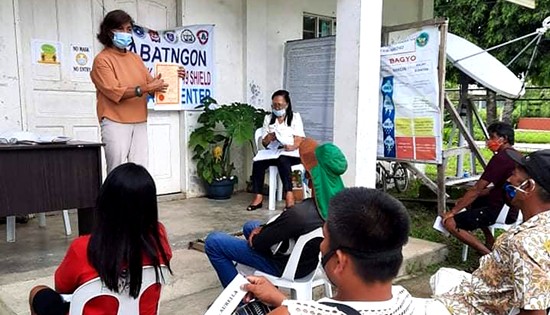
Babatngon
Municipal Agrarian Reform Program Officer (MARPO) Leonora
Asaldo emphasizes to the agrarian reform beneficiaries (ARBs)
the obligation to pay real property tax as landowners now.
(photo by MARPO Leonora Asaldo) |
14 Babatngon
farmers receive land titles from DAR
By
JOSE ALSMITH L. SORIA
July 13, 2020
BABATNGON, Leyte –
A total of 14 landless farmers from this town received their
Certificates of Land Ownership Award (CLOAs) from the Department of
Agrarian Reform (DAR) during the past two weeks amid the coronavirus
disease 2019 (COVID-19) pandemic.
Municipal Agrarian Reform
Program Officer (MARPO) Leonora Asaldo disclosed that her office
distributed 22 CLOAs under the government’s Comprehensive Agrarian
Reform Program (CARP) to 14 agrarian reform beneficiaries (ARBs)
last week and this week.
According to her, the 22
CLOAs covered an aggregate area of 28.9 hectares of agricultural
lands situated in the Barangays of Lukay, Gov. Jaro and Bagong
Silang.
Asaldo further disclosed
that there are still 73 CLOAs for distribution. “But because of the
current situation, we have to schedule the distribution every week
to control the crowd,” she added.
“We have to make sure that
social distancing is strictly observed to prevent the spread of the
dreaded COVID-19,” Asaldo stressed.
During distribution,
Asaldo emphasized to the CLOA-recipients the obligations attached to
being a beneficiary including the payment of the real property tax
as landowners now.
CARD Bank,
continues to serve in the new normal
Press Release
July 13, 2020
SAN PABLO CITY –
The new normal calls for a different approach on the delivery of
services for various organizations. CARD Bank, the largest
microfinance-oriented rural bank in the Philippines, held its
mid-year business review and planning on July 8-10, 2020 with the
theme “Moving forward to the new normal fueled by the same mission
of poverty eradication” to re-imagine and re-configure its services
for its more than 3.3 Million clients nationwide.
Attended by the bank’s
executive and management committee members from all over the
Philippines through an online conference, workshops were organized
to discuss how digitization can be integrated in the existing
methodologies and processes of CARD Bank. By the end of the business
review and planning, CARD Bank vows to increase its total clients
served to 3.5 Million and to disburse loans amounting to P13.9
Billion by the end of the year.
“We are optimistic that we
will continue to bring positive impact to Filipino families despite
the new challenges we are facing due to the COVID-19 pandemic.
Through our digital efforts, we will continue to deliver our
services to our clients,” CARD Bank President and CEO Marivic M.
Austria said. She further explained that aside from its mobile
banking application called konek2CARD, CARD Bank has partnered with
Paymaya, Panalo Express, and ECPay to provide clients with
alternative payment channels for payments of loans, savings and
insurance premiums.
A beacon of hope
Throughout the years,
microfinance institutions have provided socio-economically
challenged families with access to financial services and community
development programs. This is further highlighted as MFIs like CARD
Bank continues to become beacons of hope for the poor during the
pandemic. In accordance to the Bayanihan We Head As One Act, MFIs
like CARD Bank implemented a moratorium so that clients can allot
their budget for necessities during the community quarantines. To
support microfinance clients in bouncing back after the drastic
economic effect of COVID-19, CARD Bank disbursed loans to 221,000
clients amounting to PHP1.5 Billion from May until July 3, 2020.
Meanwhile, CARD MRI
Microinsurance group never faltered in its mission of providing
insurance to its clients. While the group also declared moratorium
in its weekly insurance premium payment, its clients remained
insured during lockdowns. Fast disbursement of insurance claims of
CARD clients continues even there were lockdowns. The group was
paying an average of 5 to 6 million pesos daily for insurance claims
in the midst of quarantines.
Currently, 99% of all CARD
Bank branches, unit offices, and branch-lite units are open and
continuing its services under the requirements and protocols
required by the new normal. An average of 60% of its workforce
reports physically to these offices, while the remaining 40% are
being retooled in preparation for a “branchless banking”. Austria
explains that by the end of the year, CARD MRI is expecting that
800,000 of its total clients will be konek2CARD users. As the number
of these digital clients increases, CARD MRI will also transform its
workforce into becoming more equipped in digital banking.
“We understand that the
shift to digitization may be challenging, but we also consider this
to be transformational for our clients. Our workforce is ready in
assisting and supporting our clients in making this shift,” Austria
stated.
Embracing the new normal
CARD Bank re-imagined its
plans and came up with new strategies to better serve the community
amidst the COVID-19 pandemic. The rural bank already embraced the
new normal and is ready to move forward and achieve its mission of
zero poverty incidence in the country.
“We admit that there are
setbacks and barriers as we move forward our digitization journey,
like meeting our clients face-to-face. But the trademark of CARD MRI
to give relevant and tailored-fit services will always remain as we
re-configure our plans and strategies to adapt to the new normal,”
said Austria.
“We see this crisis not as
a problem, but an opportunity to reach more Filipinos in the
country. We will continue to keep our eyes fixed on our main goal –
a poverty-free Philippines. We embrace the changes brought by our
current challenges on our health and economy while continuing to
transform lives as we have always done in the past three decades,”
shared CARD Bank Chairman Dr. Jaime Aristotle B. Alip.
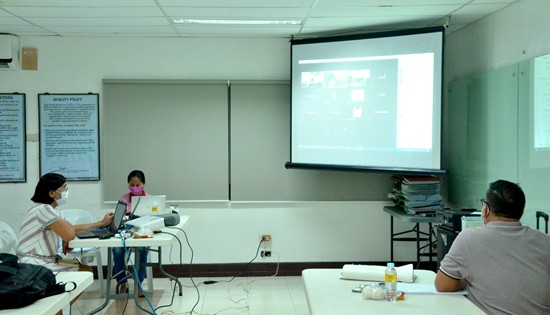
DAR
Eastern Visayas holds virtual regional pre-midyear
assessment. |
DAR-EV prepares
distribution of production inputs and livelihood support to ARBs
By
JOSE ALSMITH L. SORIA
July 10, 2020
TACLOBAN CITY –
After distributing relief packs of supplemental food, vitamins and
hygiene kits, the different provincial offices of the Department of
Agrarian Reform (DAR) in Eastern Visayas are now preparing for the
distribution of starter kits for crop production to agrarian reform
beneficiaries (ARBs) later this month.
DAR provincial officials
in Region-8 disclosed during last week’s virtual pre-midyear
assessment that procurement of seeds, fertilizers, pesticides, and
farm tools, which will comprise the crop production inputs starter
kit, is now being undertaken to catch-up the distribution scheduled
on the last week of July.
Likewise, the provincial
officials further disclosed that procurement of hogs and poultry for
the livelihood support for rural women affected by the current
crisis is also underway, and be distributed simultaneously with the
crop production inputs starter kits.
These activities are
implemented under the PaSSOver: ARBold Mover for Deliverance of our
Farmers from COVID-19 Pandemic project, which is DAR’s response to
Republic Act No. 11469, otherwise known as the Bayanihan to Heal as
One Act.
DAR-8 OIC-Regional
Director Ismael Aya-ay, explained that the ARBold Move project is
divided into four components: 1. Support to ARB Organizations (ARBOs)
as Frontliners in the Food Supply Chain; 2. Farm Productivity
Assistance to ARBs; 3. Livelihood Support for Women in Crisis
Situation; and 4. Distribution of Relief Packs of Supplemental Food
and Hygiene Kits.
For the first component,
Aya-ay further explained that 65 ARBOs throughout the region were
assisted in the marketing of their products and provided with
quarantine accreditation passes to have access at checkpoints for
the continuous delivery of food supply during the lockdown.
These ARBOs were able to
generate a combined sale of more than P23M during this period, Aya-ay
added.
Under the fourth
component, Aya-ay shared that 9,532 ARBs throughout the region
received relief packs of supplemental food, vitamins and hygiene
kits in May as immediate assistance to ease the burden caused by the
COVID-19 pandemic.
For the second component,
according to Aya-ay, 4,087 ARBs will receive crop production inputs
starter kits this month to help them meet the nutritional
requirements of their household and generate income from surplus
production.
Meanwhile, 15 female-ARB
members of ARBOs in every province will receive also this month a
livelihood package, based on their preferences and capabilities,
under the third component.
Aya-ay clarified that in
component-3, priority will be given to women with special
circumstances such as single parents, widows, senior citizens, head
of households, group of indigenous peoples, and persons with
disabilities who undertake farming activities but lost their source
of income due to community quarantine.
|

P3
CARES Loan Signing. Trade Secretary Ramon Lopez (center) on
July 3, 2020 witnessed the loan signing of the initial 15
borrowers from NCR and 26 borrowers from the Cordillera
Administrative Region of the P3 CARES Loan Program. Also in
photo are Trade Undersecretary for Regional Operations and
SB Corporation Acting Chairman Blesila Lantayona and SB
Corporation President and CEO Ma. Luna Cacanando. |
SB Corporation
starts P3 CARES loan release
By
DTI-Regional Operations
Group-SB Corp.
July 10, 2020
MAKATI CITY – The
Small Business Corporation has started releasing loans under its
COVID-19 Assistance to Restart Enterprises (CARES) program to micro
and small enterprises to help affected enterprises recover from
losses due to unprecedented setbacks that their businesses faced
during the pandemic.
As of July 8, 2020, a
total of P22 million was released to 286 P3 CARES loan
beneficiaries. Of this total, 71 are from Cavite, Laguna, Batangas,
Rizal, and Quezon (CALABARZON), 52 from National Capital Region
(NCR), 46 from Cordillera Administrative Region (CAR), 25 from Bicol
Region, 22 from Central Visayas, 26 from Eastern Visayas, 18 from
Mindoro, Marinduque, Romblon and Palawan (MIMAROPA Region), 12 from
Cagayan Valley Region, 7 from Western Visayas, 6 from Ilocos Region
and 1 from CARAGA Region.
Last July 3, Department of
Trade and Industry (DTI) Secretary Ramon M. Lopez witnessed the loan
signing of the initial 15 borrowers from NCR and 26 borrowers from
the Cordillera Administrative Region.
The total number of
approved loans to date is 2,419 accounts with a loan value amounting
to P178.2 million. The SB Corporation looks to complete the
disbursement of the P1-billion fund earmarked for this program by
the end of August.
The CARES Program is part
of the administration’s economic relief program for micro and small
enterprises affected by the COVID-19 pandemic. The SB Corporation,
an attached agency under the DTI, supervises the CARES Program.
Under the CARES program,
micro and small enterprises operating for at least a year prior to
March 16 and with an asset size not exceeding P15 million can tap
the program.
Micro enterprises with
asset size of not more than P3 million may borrow from P10,000 to
P200,000 while small enterprises with asset size of not more than
P15 million may borrow as much as P500,000. Interest rate on the
loan is pegged at 0% payable for 18 to 30 months.
The loan shall be used to
help the enterprise stabilize or recover from its losses. Micro and
small enterprises may use the loan for the following purposes:
Updating of loan amortizations for vehicle loans or other fixed
asset loans of the business; Inventory replacement for perishable
stocks damaged; and Working capital replacement to restart the
business.
Philippine IT-BPM
sector to expand delivery of services to US clients post COVID-19
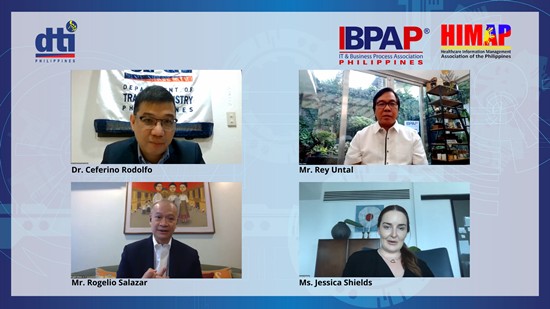
By
DTI-Foreign Trade
Service Corps
July 7, 2020
MANILA – DTI
Undersecretary and Board of Investments (BOI) Managing Head, Dr.
Ceferino Rodolfo, and key officials of the Philippine IT and
Business Process Management (IT-BPM) industry reached out Wednesday,
01 July 2020, to stakeholders in the Americas region, highlighting
projected growth and expanded opportunities, and citing the
industry’s resilience during the COVID-19 pandemic.
During the webinar
organized by the Philippine Trade and Investment Centers in
Washington DC, New York, San Francisco, Los Angeles, Toronto and
Mexico City, jointly with the Manila-based Foreign Trade Service
Corps, the Export Marketing Bureau and the Board of Investments,
Undersecretary Rodolfo and the private sector representatives
tackled how the Philippine IT-BPM industry, capably continued
supporting the IT-enabled back-office requirements of overseas
businesses in North America. During the imposition of the Enhanced
Community Quarantine (ECQ) in the country, the IT-BPM sector
provided virtually uninterrupted support to global clients,
especially those in the healthcare sector, which operated at a 90%
capacity.
Undersecretary Rodolfo
credited the Philippines’ solid economic fundamentals for cushioning
the impact of the pandemic on the country’s recovery efforts. He
shared that the Philippines recorded strong pre-Covid economic
growth performance averaging at 6.6 percent and posted a relatively
low average inflation rate of 3 percent from 2016 to 2019, and a
strong fiscal position with a highest revenue-to-GDP ratio revenue
(16.1 percent) and lowest debt-to-GDP ratio of (39.6 percent) since
1997 for 2019. The prospects for Philippine growth show a sharp
V-shaped recovery by 2021, with a growth range of 7.1 to 8.1 percent
and expanded opportunities for the IT-BPM sector.
“Our registered approved
investments have actually risen. In the first half of 2020, our
record shows that we are 112% higher in terms of approved
investments compared to the same period last year. Most of these
investments have gone to infrastructure, energy, and transport –
very important sectors when you look at the modernization of the
Philippine economy,” Undersecretary Rodolfo said.
Undersecretary Rodolfo
cited the 60,000-kilometer nationwide fiber optic network
nationwide, manufacturing support facilities, a third a telecom
player, and satellite-based connectivity solutions with high-degree
local manufactured content as strategic projects that will support
the projected rebound in 2021.
IT & Business Process
Association of the Philippines (IBPAP) President and CEO Rey Untal
highlighted that 2019 was a strong year for the IT-BPM industry,
growing by 5.8 percent in Full-time Equivalent (FTE) headcount and
7.1 percent in revenues, despite the challenges brought about by
geo-political developments and disruptive technologies such as
Artificial Intelligence/Intelligent Automation.
“Growth in 2019 was
driven, in part, by incumbent third-party operators that continued
to expand. We saw a bit of expansion in healthcare,” he added.
“Likewise, we saw a number of multinational global in-house centers
(GICs) investing and/or expanding in the Philippines. Lastly, if we
look at the creative sectors, specifically animation and gaming,
they’ve had their fair share of growth as well.”
Mr. Untal credited the
government, including the DTI, BOI, and Philippine Economic Zone
Authority (PEZA), for including the BPO sector as among those
recognized by the government’s COVID-19 Inter-Agency Task Force as
essential businesses that were allowed exemptions during the ECQ
period. “That allowed us to operationalize two work streams: the
on-site skeletal model, as well as the work-from-home capability,”
he said.
Healthcare Information
Management Association of the Philippines (HIMAP) President Rogelio
Salazar Jr. shared that 80 percent of HIMS businesses achieved
on-site productivity levels, with GICs achieving 80-90 percent
productivity and quality levels within three to four weeks from the
start of the ECQ period.
Mr. Salazar also said that
the HIMS (health information management services) segment of the IT-BPM
industry is expected to post the highest revenue and FTE headcount
growth range for 2019 to 2022, showing its strength as a high-value
contributor to the national economy. “Over the next few years, we
foresee the HIMS sector in the Philippines continuing to grow at a
much faster rate than the IT-BPM industry as a whole. That growth
will primarily be led not only by third-party players but also more
GICs looking at the Philippines for redundancy, scalability and
adaptability in their operations,” he added.
Jessica Shields, head of
International Business Operations of Dexcom Philippines, Inc., cited
talent availability, labor arbitrage, and cultural fit as factors in
Dexcoms’s decision to establish operations in the Philippines. She
also highlighted the strategic partnership between industry and the
government, enabling the sector to thrive even during the pandemic.
Dexcom, headquartered in Silicon Valley, California, invested in GIC
operations in Taguig in January 2019, and is one of the world
leaders in diabetes care technology.
Ninety-five participants
from North America and other parts of the world attended the webinar,
while the Facebook Live video garnered almost 5,000 views as of this
writing.